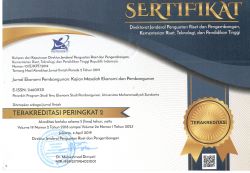Measuring Farmers Risk Aversion in Facing Climate Change in Bengawan Solo Watershed
Umayah Umayah(1), Suryanto Suryanto(2*)(1) Faculty of Economics and Business, Universitas Sebelas Maret, Surakarta
(2) Faculty of Economics and Business, Universitas Sebelas Maret, Surakarta
(*) Corresponding Author
Abstract
This research aims to understand the effect of risk aversion on the farmers’ willingness to pay (WTP) to mitigate on climate change and identify the relationship between climate change and agriculture sectors’ growth at Bengawan Solo Sub-Watershed in Upper Area. We use primary data obtained through interviews with 104 respondents, who are farmers from Sribit Village in Sragen Regency. The sampling techniques are purposive non-probability sampling. The data analysis using contingent valuation methods (CVM) and Multiple Linear Log Regression. Meanwhile, the secondary data obtained from The Central Bureau of Statistics (BPS), World Bank, and Germanwatch is collected to identify the effect of climate change on the agricultural sector. This research result shows that risk aversion does not affect farmers’ WTP to do adaptation. The variable of land area, education, and input cost affect significantly (5%), while working experience also affect to WTP at 10% significance level. The implication of low-risk aversion implies farmers not aware of climate change. Risk reduction efforts will not be a priority for farmers because the advantages to adaptation is not worthy. The relationship between production levels and negative climate change scores confirms that climate change can reduce farmer production.
Keywords
Full Text:
PDFArticle Metrics
Abstract view(s): 365 time(s)PDF: 378 time(s)
Refbacks
- There are currently no refbacks.
















